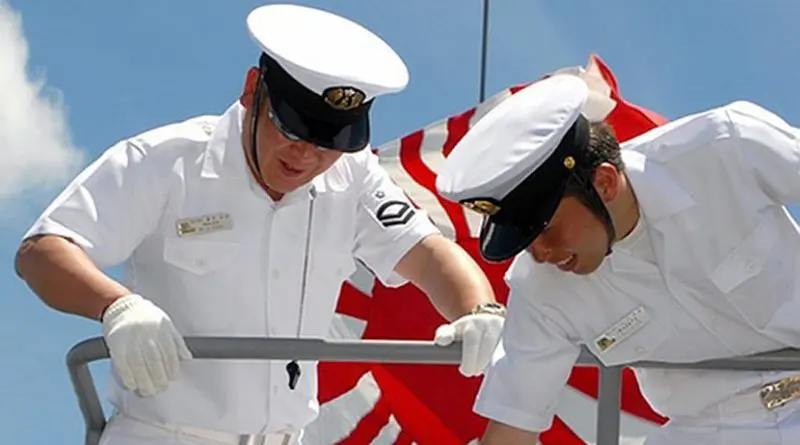Japan–US Relations In A Post-COVID-19 World – Analysis
By Fumiaki Kubo*
Many are insisting that we are seeing a new world order emerge in the current COVID-19 pandemic. But in East Asia there are a number of reminders that we still live, at least partly, in the same world of geopolitics with a high level of tension.
Chinese vessels continue to intrude into the contiguous zone and territorial sea of Japan near the Senkaku Islands. From January to March 2020, 289 Chinese vessels entered the contiguous zone, which is an increase of 57 per cent compared to the same period a year ago. On 11 April, a Chinese naval fleet led by the country’s first aircraft carrier Liaoning passed through the Miyako Strait off Okinawa. On 9 May, the Japan Coast Guard reported that two China Coast Guard ships approached and chased a Japanese fishing boat in Japanese territorial waters near the Senkaku Islands in the East China Sea. A barrage of North Korean missiles were also fired from the ground and fighter jets during April.
While it is difficult for Japan to deal with the unpredictability of US President Donald Trump — who reportedly said as recently as June 2019 that since Japan does not have to defend the United States, the alliance is unfair and should be changed — Japan has managed to achieve relatively good relations with the Trump administration.
One of the major reasons for this is the personal relationship between Japanese Prime Minister Shinzo Abe and President Trump. Another is the Trump administration’s tough stance towards China. For all its drawbacks, from the perspective of some Japanese government officials, the Trump administration seems to better serve Japan’s national security interests than former president Barack Obama’s administration did as far as a certain set of issues are concerned, including its relations with China.
Even so, Japan would prefer more predictability and a deeper understanding of the basic mechanisms of the alliance with the United States under President Trump. It still wishes that the United States was a member of the Trans-Pacific Partnership (TPP). It wishes too that there were no sanctions on Japanese steel and aluminium by the United States. Japan does not embrace State Secretary Mike Pompeo’s suggestions that COVID-19 originated in a laboratory in Wuhan without solid evidence. And Japan misses strong US global leadership as exemplified by the Truman Doctrine or Marshall Plan, which is not on the cards under the current administration.
For Japan’s diplomats, it would be a nightmare to wake up one day to find the United States and China ganging up to divide the Pacific Ocean or even the world. When former Obama national security advisor Susan Rice stated that ‘when it comes to China, we seek to operationalize a new model of major power relations’ in 2013, it stirred anxiety for Japanese diplomats. In 2014, former US state secretary John Kerry pointed out that one of the most urgent existential threats to the Asian region comes from climate change. But his remarks failed to resonate with countries such as Japan exposed to traditional security threats from North Korea and China.
It is in this context that many officials and politicians in Japan approve of President Trump’s policies regarding China, if not without reservations, at least from a comparative perspective. While there is no way to ascertain which administration objectively works better for Japan, from a Japanese perspective China’s behaviour has somewhat favourably changed after facing mounting pressure from the Trump administration in many quarters. For instance, China was eager to accept the invitation from Japan to President Xi Jinping for a state visit, which was planned for April but postponed due to the pandemic.
The United States needs to overcome the current COVID-19 crisis as quickly as possible, not merely for its own interests but also for those of its allies, including Japan. If the crisis lasts longer and the situation becomes more serious, the US economy will suffer greater damage. This will likely require a reduction in defence expenditures and overseas assistance, such as for advancing digital connectivity in ASEAN nations, precisely when they are needed most.
US politics is also at risk of becoming even more unstable, inviting a larger-scale revolt against the foreign policy establishment favouring increased isolationism. The US election result in 2016 was a consequence of such a revolt. Even now, there is backlash against the advice of public health experts in the fight against COVID-19, which was incited, at least implicitly, by President Trump.
Of course, the current state of the United States under President Trump will not continue forever. Yet, a second (or even third) Trump-like leader might be expected in the near future in US politics, given the entrenched nature of anti-elitism in the country. Every US ally should be prepared for this scenario. A relatively predictable and globalist US administration that is not unreasonably soft on China may be a rare commodity in the coming years. Recognising this possibility, Japan is quietly accelerating its transition towards greater defence self-reliance. It probably needs to pick up the pace.
*About the author: Fumiaki Kubo is the A Barton Hepburn Professor of American Government and History at the Graduate Schools for Law and Politics, The University of Tokyo.
Source: This article was published by the East Asia Forum

